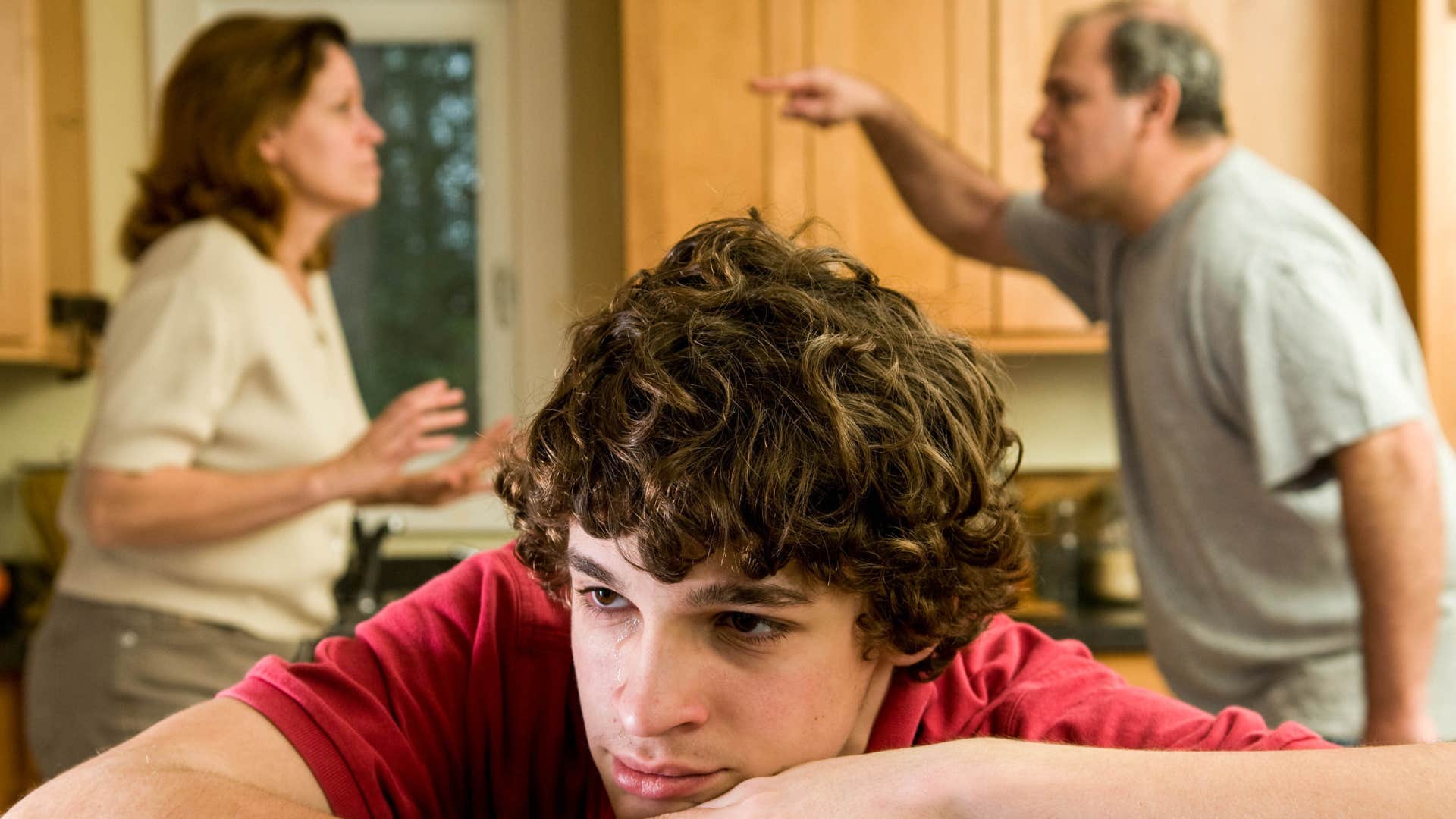People Who Say "I Don't Really Talk To My Family Anymore" Usually Have These 11 Reasons
Sometimes going no-contact is the healthiest thing a person can do for themselves.
 kaanturker | Shutterstock
kaanturker | Shutterstock People who say that they don't talk to their families anymore usually have deeply personal reasons as to why they cut ties with family members. Some people try to avoid the toxicity in their relationships with relatives, while others distance themselves because of traumatic childhood experiences. But in reality, most people who distance themselves from family do it for very real, often painful reasons.
Whether it's due to toxic dynamics or constant boundary violations, cutting ties with parents or siblings can become an act of self-preservation. Many reach a point where staying connected hurts more than walking away, and instead of continuing to play the good child or peacemaker, they finally choose peace for themselves. Here are the reasons people say they no longer speak to their family — and why those choices often make more sense than outsiders realize.
People who say "I don't really talk to my family anymore" usually have these 11 reasons:
1. Their family dynamic is toxic (and has never changed)
 fizkes | Shutterstock
fizkes | Shutterstock
Some family members are just toxic people who are willing to drag other members of their family down with them both mentally and physically. Around 29% of Americans are estranged from at least one immediate family member like a parent, sibling or grandparent. In particular, people who say they don't speak to a toxic parent do so because they find their theatrics to be too excessive. The constant berating or judgments over how their children run their lives can chip their self-worth down.
Despite the pain of parental-child estrangement, many find it necessary to protect their peace of mind. Every child's first bully is a parent, whether they like to admit it or not. A parent's scrutiny can do a lot more damage to their child than they realize. Their children will grow accepting the same type of behavior from strangers, which will result in them not sticking up for themselves.
2. They were emotionally or physically abused
 threerocksimages | Shutterstock
threerocksimages | Shutterstock
The most painful reason as to why people don't talk to certain family members anymore is because of their ability to ignore or even hide evidence of physical and emotional abuse within the home. Many children and young adults suffer abuse in the home. Among high school students, 25% experience physical abuse in childhood, with some overlap between types.
Intimidation is the most prevalent tactic used to cause panic or fear within the victim. Abusers will torment the victim further by spreading a narrative, claiming that the victim is at fault while painting themselves as the real victims. Adolescents being exposed to marital conflict or strife is another form of abuse that many don't talk about. In youth, parents cause the most damage to their children when they make excuses for their abusers or even argue in front of them. These children grow up estranged from one or both of their parents later on in life.
3. They don't feel supported or understood
 Chay_Tee | Shutterstock
Chay_Tee | Shutterstock
When a parent doesn't meet their child's emotional needs, it can lead to confusion and a lack of self-confidence. Many adult children describe a sense of emotional disconnection from their parents by questioning their self-worth, replaying conversations they wish had gone differently, and wondering if they're to blame for the relational distance. People who are not connected to immediate family, like their parents, keep their distance because that is all they have ever known.
As they grow, they have to learn how to be strong without parental support. For them, life was all about survival, and they are often glad that they left their parents behind. Walking away becomes a form of self-preservation, a way for them to enjoy their lives that no one else helped them build.
4. Their boundaries are never respected
 Prostock-studio | Shutterstock
Prostock-studio | Shutterstock
Envy and jealousy are a natural part of sibling rivalries; however, this type of dynamic is not always the case. In many families, there is always one sibling testing the boundaries of all the others. This could be by making a spectacle of themselves in public or even embarrassing the family publicly with their actions. The troubled child will often be the one who gets away with the most and expects the entire family to put up with their entitled behaviors.
This causes resentment among their siblings as they are held to a different standard. Sibling reunification is possible, but only if both parties are willing to work on fixing their estrangement. While some hope for reconciliation, other siblings do not. Most people don't realize that strains within a family cause a ripple effect that eventually affects others.
5. Their values and beliefs clash too deeply
 9nong | Shutterstock
9nong | Shutterstock
When values clash between family members, it can cause drama and tension to the point where one of them stays away from the rest of the group. Being part of a blended family is even more tricky to navigate because while they aren't technically related, they still have to see each other at gatherings. Estrangement between step-siblings or even extended family, like cousins, can be just as volatile as conflict with a parental figure when different beliefs get in the way.
Subjects such as politics, religion, and behaviors can erode the relationship. This often happens when one individual disagrees with the lifestyle of another or looks down on them. Families want what's best for each other, but sometimes their judgments can make them seem elitist and out of touch with reality.
6. Addiction or mental illness runs in the family
 Ground Picture | Shutterstock
Ground Picture | Shutterstock
Addictions or mental illness within a family can create long-term dysfunctions that are difficult to break. When a sibling or child struggles with substance abuse issues, it can be a disruptor as they lose those closest to them due to their substance battle. They may even receive criticism from members of their family for stealing money from them or being neglectful of their children in favor of their addictions.
People who put their addictions above their family members cause them distress. A study from Iran found that 29.4% of family members with a relative addicted to substances were suspected of having some type of mental disorder, including anxiety and depression. Most will see having an intervention as a way to help their family member out, but there is no guarantee that they will stay clean.
7. They feel emotionally neglected or abandoned
 fast-stock | Shutterstock
fast-stock | Shutterstock
Elders often talk about their struggle to maintain communication with their children after leaving the nest. While some may place the blame on the parent, sometimes the children are the ones who lack empathy. Not everything in the world is cause and effect. Many parents raise their children well, yet they still behave in negative ways.
Neglect and emotional abandonment don't just happen to children but to parents as well. Some children will cut their parents off because they no longer serve any purpose to them beyond a blank check. Unfortunately, this occurs, but sometimes it's a blessing in disguise for an elderly parent. The stressful nights worrying won't occur as often, and they may even find their health improving as a result of this distance from their problematic child.
8. There is unresolved trauma or ongoing family conflict
 fizkes | Shutterstock
fizkes | Shutterstock
Family trauma often comes from unresolved conflicts that occur when we are young, and as adults, we now want to try to fix them. Where the conflict escalates is when the person who caused us trauma, likely our parents, doesn't feel the same. They will deny that any abuse took place and remind us of how sensitive we are being.
We inherit our generational traumas from our fathers and spend the rest of our lives trying to heal ourselves from them. For both men and women, a father is the first male role model in their lives. When they grow up with one who is abusive, it can warp their minds and make them distrust others. Many who end up suffering from this trauma choose to become loners and separate themselves from the family dynamic, especially if the person who caused the trauma is still among them.
9. They need to protect the family they created
 Ground Picture | Shutterstock
Ground Picture | Shutterstock
People who don't speak to their family members sometimes do it as a necessity to protect their own little family that they created. In-laws often become a problem within marriages and long-term relationships when they vocalize opinions that the couple never asked them for. Having in-law problems is extremely common, and if not properly dealt with, can lead to the relationship breaking down.
Mothers, in particular, will unconsciously interfere in their son's relationships due to fear of competition for resources and attention. A son who is fed up is willing to put his relationship with his mother at risk to protect his wife and children. Some parents feel entitled to their children even after they have moved out of the house and have started their own families.
10. They've changed, but their family won't accept it
 Prostock-studio | Shutterstock
Prostock-studio | Shutterstock
For some, growing into their true identity — whether it involves gender, sexuality, beliefs, or lifestyle — means stepping into a more authentic version of themselves. But when family members hold onto outdated views or unexamined biases, that growth is often met with resistance instead of support.
Rather than trying to understand, the family takes the change personally, more concerned with appearances than the person's happiness. Over time, the effort to keep the peace or seek approval becomes exhausting. Eventually, they choose distance over pretending to be someone they’re not.
11. Everyone is being selfish (and they want to end the cycle)
 fizkes | Shutterstock
fizkes | Shutterstock
Sometimes people cut ties not just because one person is toxic, but because the whole family dynamic revolves around blame, manipulation, or control. Everyone is too busy protecting their own egos to take real accountability, and no one wants to break the cycle — until one person finally does.
To outsiders, it might seem cold. But to them, walking away isn't about revenge; it's about refusing to repeat the same dysfunction they grew up with.
Behind closed doors, toxic families often create chaos that outsiders never see, causing emotional turmoil, financial instability, and constant stress for those closest to them. To the outside world, they may seem charming or harmless, like a rowdy toddler who's always excused. But the people living with their behavior are the ones absorbing the damage day after day. From the outside looking in, it’s easy to misjudge the situation, but choosing to cut someone off isn't selfish when that person is actively harmful to your well-being.
Sylvia Ojeda is an author who has over a decade of experience writing novels and screenplays. She covers self-help, relationships, culture, and human interest topics.

